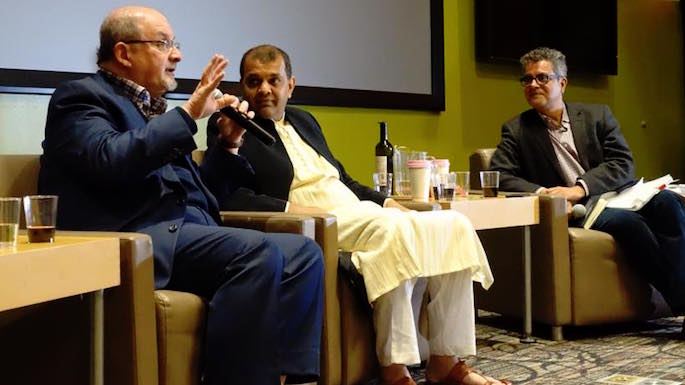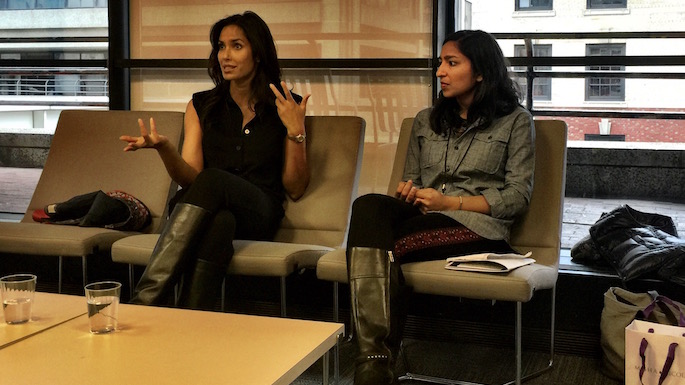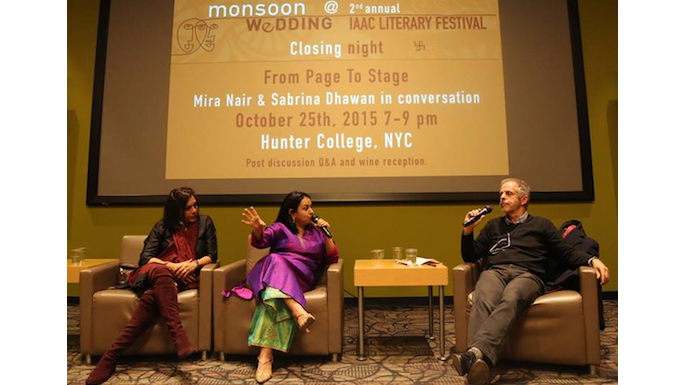|
| |
SECOND ANNUAL IAAC LITERARY FESTIVAL
in collaboration with Hunter College, CUNY, 625 Park Ave, NYC
OCTOBER 22-25, 2015 |
| Reviews |
india.com
2nd Annual IAAC Literary Festival Highlights South Asian Authors, Writers
By Priya Arora on November 13, 2015 |
 |
| Photo Source: Facebook/IAAC
|
In a tribute to its home city, the second annual Indo-American Arts Council (IAAC) Literary Festival kicked off in New York City with a night celebrating South Asian writers, novelists, authors, directors, and more. The festival began with a kickoff event featuring Madhur Jaffrey’s “Vegetarian India on October 22.” The following night, the festival’s Opening Night Reception was held at Hunter College - the panel discussion entitled “Bombay Boys” featured Suketu Mehta (“Maximum City”) and Salman Rushdie (“Midnight’s Children,” “The Satanic Verses”) in conversation with Amitava Kumar (“Lunch with a Bigot: The Writer in the World”).
|

Photo Source: Facebook/IAAC |
| Mehta, best known for his literary ode to his home city, Bombay, “Maximum City,” read an excerpt from his upcoming book - a similar collection of narratives dedicated, this time, to New York City. “I’ve been going around these cities all around the world, in India, Europe, America, and I walk around and talk to people - so a lot of these stories are about migrants,” Mehta explained. “At this point, we have some 350 million in the world who are living in a country other than the one they were born in. So, the experience of dislocation that migrants keep experiencing fuels the need for recollection, which becomes recollection. These are the stories that I’m interested in - the stories that people have in their mind before they move to cities, and then the stories they send back.” |
Rushdie also read from his latest release, “Two Years, Eight Months, and Twenty-Eight Days,” before pitching into the conversation around what he called a renaissance of storytelling. “Suddenly, quite a lot of very good writers are trying to do this thing called harvesting stories of ordinary life, of people who don’t have the ability to tell their own story. And what is interesting is the way in which the stories are told is very literally - they’re not told in kind of the journalistic way.” |
| “If you’re doing this for New York,” Rushdie said of Mehta’s upcoming book, “I think what you’ve been interested in New York, as I am, is this wealth of new immigrants. The new kinds of immigrants, not just traditional immigrants who built the city - the Irish, Italians, Jews - but now everyone.” |
| The next two days of panels during the festival included several niche and currently relevant topics such as, “Writing for Network Television,” “Self-Publishing,” “Publicizing Books Through Social Media,” “Over-Exposed and Invisible: Writing the South Asian Muslim Experience,” “Negotiating South Asian LGBT Identity,” “Women Fiction Writers,” and many more. |
| On the last day of the festival, in a panel called, “Everything Starts With the Written Word,” author and celebrity Padma Lakshmi talked in depth about her unique career path from modeling to food, navigating multiple identities, and her upcoming memoir (to be released in March 2016) entitled “Love, Loss, and What We Ate.” |

Photo Source: Facebook/IAAC |
| Speaking of the early influences on her palette, Lakshmi reminisced of her earliest food memories as eating chaat and other Indian street food. Her cookbooks, which have routinely focused on healthy recipes with a low-cost/low-resource focus, were inspired largely by her mom. Lakshmi recalled childhood memories growing up in NYC, and that she’s often inspired to cook and share recipes that her mother would have wanted to do. A driving force throughout her life, Lakshmi said, has been “defining glamor not as expensive, but instead as cultured.” |
| She was especially driven, in a process that took nearly seven years, to finally share parts of her life with the world through a memoir. Speaking of the writing process, Lakshmi admitted that she was afraid to write for a long time, intimidated by the many authors she looked up to, including her biggest inspiration, MFK Fisher. In the end, she “finally wanted to write a book that I would want to read,” Lakshmi said of navigating the writing process. |

Photo Source: Facebook/IAAC |
| The festival ended with an engaging conversation with England-born screenwriter Sabrina Dhawan and director Mira Nair talking about the transition from page to stage. Nair previously adapted her film, “The Namesake,” from the book of the same name - and now, “Monsoon Wedding” is now moving from the big screen to Broadway. Each type of writing, from screenplays to theater, has the power to reflect a story through very different lenses each time - all without changing the heart of the characters, plot, and story. |
| Overall, a power-packed weekend full of honoring the craft of writing, in all forms, and the growth of South Asian literature, the IAAC Literary Festival showed yet again the power of any form of art to bring together the Diaspora. |
|
| URL: http://www.india.com/arts-and-culture/2nd-annual-iaac-literary-festival-highlights-south-asian-authors-writers-683542/ |
| |
|
|

